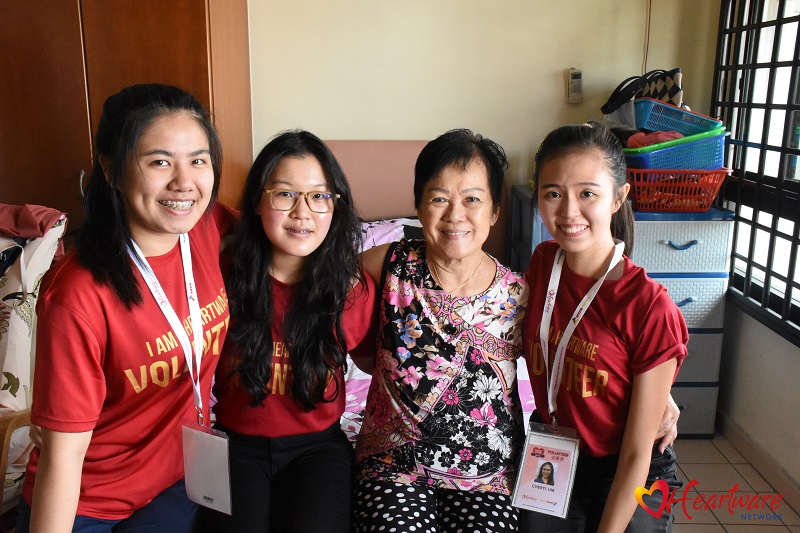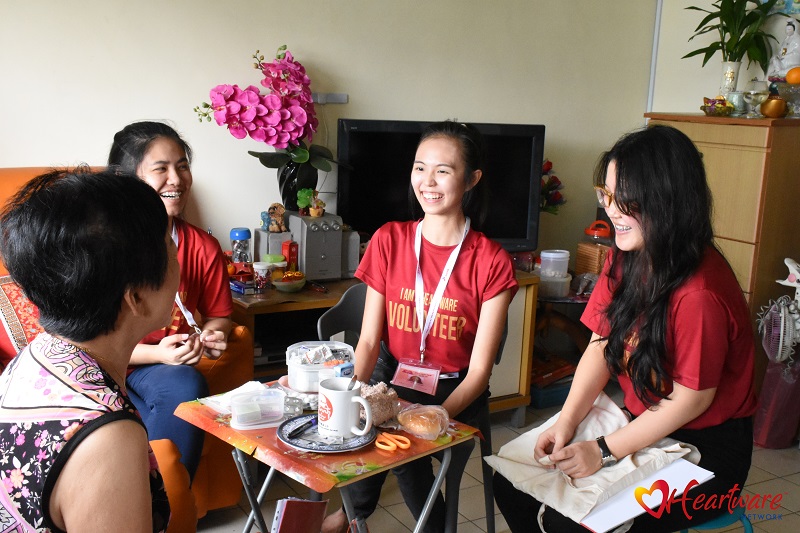It’s More Than Just You

Cheryl (rightmost) with her HWSOP volunteer group and one of the elderly beneficiaries during a biweekly visitation.
Groups work together to achieve a common goal, and within these groups exists a structure – a leader who stands at the frontlines, and members who pull their own weight. Together, they achieve more than they could on their own.
Volunteer groups, too, follow this system.
Behind the title of a volunteer leader, there is a long list of duties and a need for strong emotional resilience to guide fellow volunteers in serving the community. We swim in the thoughts of two volunteer leaders from two contrasting programmes – one from Heartware Support Our Pioneers Programme (HWSOP), and another from Heartware Tuition Programme (HWTP)
—
Meet Cheryl, a HWSOP volunteer leader

Cheryl and her team all smiles during one of the HWSOP biweekly visitations, which aim to support the social and emotional needs of socially-isolated elderly.
Her responsibilities are endless; aside from administrative duties such as keeping records and updates on the elderly, attendance-taking, and deploying and debriefing volunteers, Cheryl also plans field trips and celebrations for events such as Chinese New Year.
However, a leader does not operate like a machine. Beyond efficiently completing these duties that ensure the smooth running of the HWSOP programme, Cheryl serves with a heart; she takes the extra step to form close relationships with the elderly and community she serves. Additionally, she cares for the volunteers under her charge and ensures their well-being.
Familiarity with her roles and honing the ability to juggle these various responsibilities were not born overnight. Cheryl tells us she was only convinced to take up the extra job of being a leader after her initial interview with a Heartware staff to become a regular volunteer. She saw it as an opportunity to step out of her comfort zone and improve her own leadership capabilities.
Moreover, her natural inclination to serving others also convinced her to become a volunteer leader. Her natural empathy for the underprivileged and ability to prioritise the well-being of others over herself both helped her realise that being a leader would allow her to contribute on an even greater scale.
Needless to say, being a volunteer leader comes with many challenges. Being introverted, Cheryl initially struggled with public speaking and conducting debrief sessions was a fear. Believing leaders ought to be confident and charismatic, she attempted to be more outspoken, and she also learned to play on her strengths by allowing others to take charge of the conversation, helping her gain new insights and learning from her fellow volunteers.
Her humility has also helped her realise how important she is in empowering volunteers and encouraging them. Sensitivity to their needs and providing them with the right amount of recognition has helped her keep them motivated while building better relationships.
—
Meet Javier, a HWTP volunteer leader

Javier (left) with his HWTP tutee, who he meets weekly to provide academic tutoring and impart values.
Javier’s story follows that of Cheryl’s very closely; there are striking similarities, yet different in their own right.
Javier’s duties include planning lessons and regular administrative work. Being a servant leader who leads by example, he takes the first step to experiment with new teaching methods so that his fellow volunteers would feel more confident in stepping out of their comfort zones. Despite the laborious process, he continues to design lessons based on feedback to constantly improve and help others, eventually creating an inclusive environment where every tutor’s voice is heard.
Javier’s passion for teaching spurred him to pick up the role of being a volunteer leader, and along with this new badge of honour came multiple challenges. Communication (with both children and his fellow tutors) was often a challenge, and he found himself having to quickly adapt to various nuances and mood changes to effectively achieve various goals and learning outcomes. He tells us that it is important to “think like a kid” and ask yourself “What would you like? What would you hate to see?”. Being approachable and amiable amid the stress is not easy. He also had to maintain good relations with his fellow tutors, and realised the importance of forming close friendships and constant encouragement.
Like every other volunteer, Javier does take away key lessons and values from each session. He has become more flexible and adaptable as he realises the importance of changing his methods to better fit the tutees and tutors he works with. Exposed to the reality of marginalised communities and a lack of equity, he also feels heartened to help children in difficult circumstances.
He tells us that he was humbled by his lack of experience, and strove to provide these children with the best possible learning experience he could. Becoming more patient was just one of the many lessons he learned, and he realised the importance of being less overbearing. Mutual trust proved itself to be a key part of both ensuring good lessons for the children under his charge and keeping the other tutors emotionally invested in their duties.
—
Something small, something borrowed
From the viewpoints of volunteer leaders, Javier and Cheryl have constantly stressed the importance of everyone playing their part in ensuring a pleasant experience for both the beneficiaries and volunteers alike. As leaders, they act as a bridge between volunteers and beneficiaries. When we take a glance at what they have to do, we realise that their impact goes way beyond their immediate circle; it affects everyone else too. This doesn’t undermine or discount the efforts of anyone else; one’s status as a volunteer does not make their contributions any less or small. Volunteer leaders and volunteers alike both benefit society and are extremely important. Every act of kindness impacts our society in ways much bigger than you think.
So, be grateful and kind to all, and appreciate everyone’s efforts and capabilities; we are all important to cultivating a loving and generous society.
